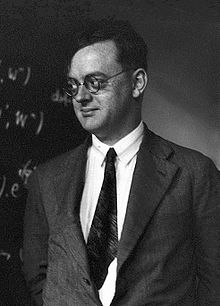Pascual Jordan
| Pascual Jordan | |
|---|---|

Pascual Jordan in the 1920s
|
|
| Born | 18 October 1902 Hanover, Kingdom of Prussia, German Empire |
| Died | 31 July 1980 (aged 77) Hamburg, West Germany |
| Nationality | Germany |
| Fields | Theoretical physics |
| Institutions | Technical University Hanover |
| Doctoral advisor | Max Born |
| Doctoral students | Jürgen Ehlers, Engelbert Schücking |
| Known for | Quantum mechanics, quantum field theory, matrix mechanics, Jordan algebra |
| Notable awards | Max Planck Medal (1942), Carl Friedrich Gauß Medal (1955) |
Ernst Pascual Jordan (German: [ˈjɔɐ̯daːn]; 18 October 1902 – 31 July 1980) was a theoretical and mathematical physicist who made significant contributions to quantum mechanics and quantum field theory. He contributed much to the mathematical form of matrix mechanics, and developed canonical anticommutation relations for fermions. While the Jordan algebra is employed for and is still used in studying the mathematical and conceptual foundations of quantum theory, it has found other mathematical applications.
An ancestor of Pascual Jordan named Pascual Jorda was a Spanish nobleman and cavalry officer who served with the British during and after the Napoleonic Wars. Jorda eventually settled in Hanover, which in those days was a possession of the British royal family. The family name was eventually changed to Jordan (pronounced in the German manner, [ˈjɔʁdaːn] or [ˈjɔɐ̯daːn]). A family tradition dictated that the first-born son in each generation be named Pascual.
Jordan enrolled in the Hanover Technical University in 1921 where he studied an eclectic mix of zoology, mathematics, and physics. As was typical for a German university student of the time, he shifted his studies to another university before obtaining a degree. Göttingen University, his destination in 1923, was then at the very zenith of its prowess and fame in mathematics and the physical sciences. At Göttingen Jordan became an assistant first to mathematician Richard Courant and then to physicist Max Born.
...
Wikipedia
